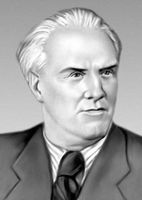 Nikolay Semyonovich Tikhonov was born 4 December 1896 in a middle-class family in St. Petersburg. This future patriotic war balladeer was a hussar in the tsar's army of World War I, but by 1917 he was an ardent Bolshevik supporter. Of the Bolsheviks he wrote: Nikolay Semyonovich Tikhonov was born 4 December 1896 in a middle-class family in St. Petersburg. This future patriotic war balladeer was a hussar in the tsar's army of World War I, but by 1917 he was an ardent Bolshevik supporter. Of the Bolsheviks he wrote:
Gvozdi by delat' iz etikh lyudey;
Krepche b ne bylo v mire gvozdey!
("If you make nails out of these people;
There would be no stronger nails in the world!")
Tikhonov joined the Red Army during the Revolution and Civil War years.
After demobilization he settled in the town which was then known as Petrograd and became associated with the Serpion Brothers (Zamyatin, Zoshchenko, Shklovsky, etc.). His first two collections of poems, "The Horde" (1922) and "Mead" (1922), were expressions of his sensations and adventures in his years of war. His work also showed the influence of Acmeism, employing concrete images, pictorial detail, and semantic precision.
In the mid-1920s, he fell the influence of Velimir Khlebnikov and Pasternak and began experimenting with his poetic style. In search of new themes and colors, he traveled to Central Asia.
Social issues were important to this fiercely patriotic writer, and many of his short stories of the 1930s concern socialist construction projects in Central Asia.
He even tried his hand at a screenplay for the 1931 film "Teryak", an agitprop film about the struggle against illegal drugs in Turkmenistan. The plot of this rather unprofessional film included an attempted assassination of a party worker. The film, however, was soon withdrawn from release because, as "Pravda" said, it had "mistaken tendencies." Tikhonov's reputation was not damaged, however, and during World War II he continued producing works idealizing courage and duty.
He served as head of Soviet Writers Union from 1944 to 1946 and won three Orders of Lenin, three Stalin Prizes, and one Lenin Prize.
Despite his earlier respect for the poetry of Pasternak, Tikhonov eagerly joined in the campaign against the Nobel winner in the 1950s.
Nikolai Semyonovich Tikhonov died in Moscow on 8 February 1979.
|













 Culture and Art
Culture and Art  Literature
Literature  XX century literature
XX century literature